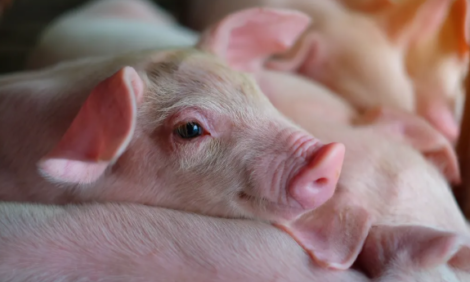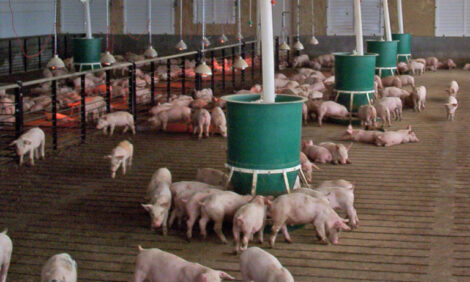



Pigs fed yogurt may have lower salmonella levels.
AMES, Iowa - Feeding pigs a yogurt-like concoction may help lower salmonella levels in the animals before they leave the farm for the packing plant. That and other alternatives to swine antibiotics will be explored by Iowa State University researchers with a $600,000 grant from the U.S. Department of Agriculture."We hope to show that antibiotic alternatives administered shortly before slaughter can reduce salmonella levels," said Hank Harris, ISU microbiologist. "The timing is important because many scientists believe the risk for contamination increases during the periods when pigs are transported and held at the packing plant."
That and other alternatives to swine antibiotics will be explored by Iowa State University researchers with a $600,000 grant from the U.S. Department of Agriculture.
"We hope to show that antibiotic alternatives administered shortly before slaughter can reduce salmonella levels," said Hank Harris, ISU microbiologist. "The timing is important because many scientists believe the risk for contamination increases during the periods when pigs are transported and held at the packing plant."
Each year foodborne salmonella makes between 2 and 4 million Americans sick. The research comes at a time when some strains of salmonella have become resistant to antibiotics. "If resistant salmonella makes its way to humans via foods, it could pass on its resistance to other organisms, making treatment of human diseases harder," Harris said.
Antibiotic alternatives are important to the pork industry's future, said David Pyburn, director of veterinary science at the National Pork Producers Council (NPPC). Pyburn serves with Harris on an NPPC working group on salmonella.
"Several human health organizations are moving toward regulations that reduce the use of antimicrobial products in animal agriculture," Pyburn said. "We need to be prepared with safe, effective alternatives in case the time comes when those products aren't available."
Harris has been studying two alternatives. One is probiotics, which encourages the growth of "friendly" bacteria to prevent disease-causing bacteria from getting out of control. In preliminary studies, salmonella was reduced in young pigs that were fed milk containing Lactobacillus, a bacterium taken from the pigs' intestinal tracts.
"We're basically feeding yogurt to pigs," said Harris. "Lactobacillus is a common yogurt culture. We want to repeat the tests using older, market-ready pigs. If results are positive, farmers could decrease salmonella levels in their animals by using the method two to three weeks before the pigs are marketed."
The other alternative is bacteriophages - viruses that infect and kill bacteria. Early ISU results show pigs given bacteriophages orally or by injection have less salmonella than other pigs. Harris said pigs could be dosed hours before they are processed at the packing plant.
If the alternatives prove promising, ISU will train producers, veterinarians and processors on how to implement them.
In another part of the project, ISU will train state diagnostic lab workers to perform a Danish test to rapidly determine salmonella levels in pigs. The test, which is used to monitor salmonella in virtually every swine herd in Denmark, will help producers better determine the level of exposure to salmonella on their farms, Harris said.
ISU microbiologist Isabel Harris will be the project's co-leader. The new project is based on results of studies funded by three NPPC grants, as well as support from PIC International, a swine genetics company, and the Food Safety Consortium, a three-state meat safety program. 10/13/2000 12:09 p.m.CDT
Source: Press release from Iowa State University
"We hope to show that antibiotic alternatives administered shortly before slaughter can reduce salmonella levels," said Hank Harris, ISU microbiologist. "The timing is important because many scientists believe the risk for contamination increases during the periods when pigs are transported and held at the packing plant."
Each year foodborne salmonella makes between 2 and 4 million Americans sick. The research comes at a time when some strains of salmonella have become resistant to antibiotics. "If resistant salmonella makes its way to humans via foods, it could pass on its resistance to other organisms, making treatment of human diseases harder," Harris said.
Antibiotic alternatives are important to the pork industry's future, said David Pyburn, director of veterinary science at the National Pork Producers Council (NPPC). Pyburn serves with Harris on an NPPC working group on salmonella.
"Several human health organizations are moving toward regulations that reduce the use of antimicrobial products in animal agriculture," Pyburn said. "We need to be prepared with safe, effective alternatives in case the time comes when those products aren't available."
Harris has been studying two alternatives. One is probiotics, which encourages the growth of "friendly" bacteria to prevent disease-causing bacteria from getting out of control. In preliminary studies, salmonella was reduced in young pigs that were fed milk containing Lactobacillus, a bacterium taken from the pigs' intestinal tracts.
"We're basically feeding yogurt to pigs," said Harris. "Lactobacillus is a common yogurt culture. We want to repeat the tests using older, market-ready pigs. If results are positive, farmers could decrease salmonella levels in their animals by using the method two to three weeks before the pigs are marketed."
The other alternative is bacteriophages - viruses that infect and kill bacteria. Early ISU results show pigs given bacteriophages orally or by injection have less salmonella than other pigs. Harris said pigs could be dosed hours before they are processed at the packing plant.
If the alternatives prove promising, ISU will train producers, veterinarians and processors on how to implement them.
In another part of the project, ISU will train state diagnostic lab workers to perform a Danish test to rapidly determine salmonella levels in pigs. The test, which is used to monitor salmonella in virtually every swine herd in Denmark, will help producers better determine the level of exposure to salmonella on their farms, Harris said.
ISU microbiologist Isabel Harris will be the project's co-leader. The new project is based on results of studies funded by three NPPC grants, as well as support from PIC International, a swine genetics company, and the Food Safety Consortium, a three-state meat safety program. 10/13/2000 12:09 p.m.CDT
Source: Press release from Iowa State University








